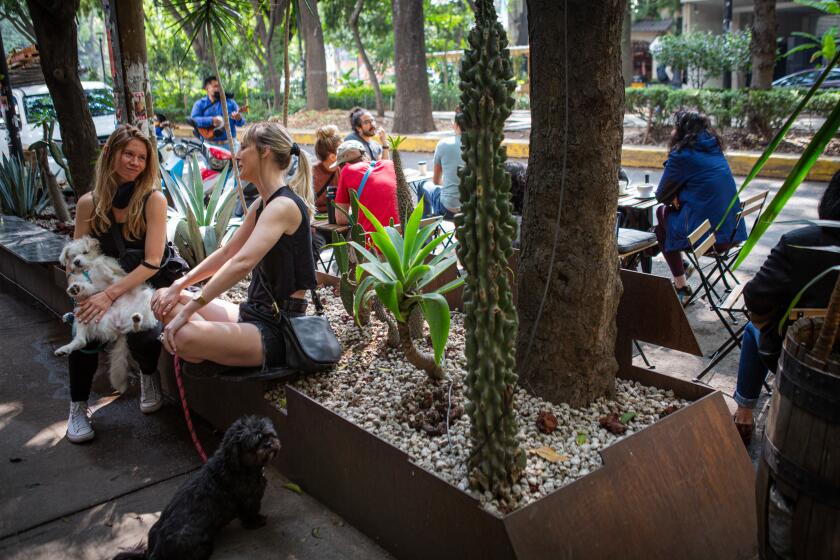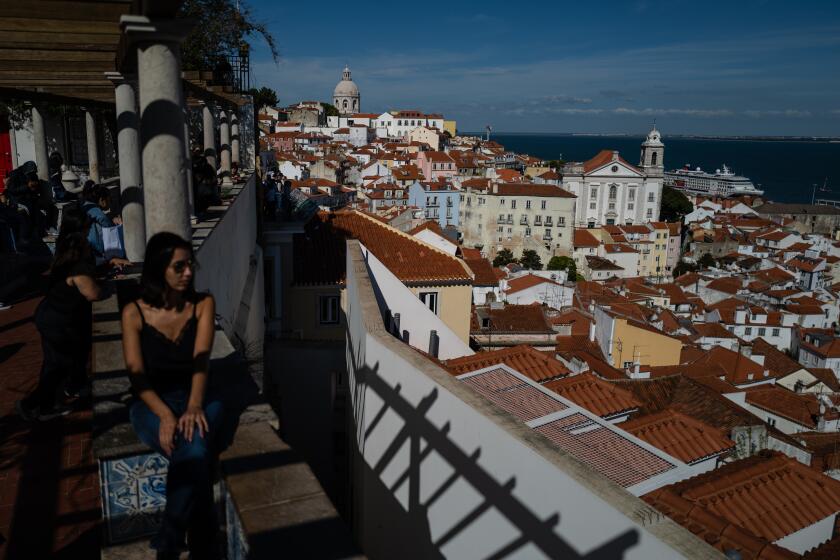Column: The new generation of smug American expats in Mexico needs to face the truth

The dusty truck bounced along the narrow streets of Jomulquillo, the village in the Mexican state of Zacatecas where my father was born. It darted in front of vacant homes, slowed past the church and finally stopped in front of the rancho’s sole corner store.
There, I stood alongside my dad and a group of older men — what was left of Jomulquillo’s population since nearly everyone else had left for East Los Angeles and the San Fernando Valley decades earlier.
We eyed the man who slowly emerged from the pickup — middle-aged, white, wearing sunglasses, a polo shirt, jeans and a smile. He asked in broken Spanish to no one in particular whether there were any houses for sale. Everyone was so bewildered at the sight of a gabacho in a tiny hamlet up in the mountains of central Mexico that we stayed silent for a bit.
Then came a chorus of polite, but firm “No.”
I asked in English what he was doing so far from the United States.
“I want to move here,” said the man, who never gave his name. “It’s too expensive back home.”
Unprompted, he went on to complain about liberalism, about how the U.S. was a failed country, and how he wanted to spend his retirement in peace. He asked if we knew of any houses for sale in Jerez, the city to which Jomulquillo pertains.
Nope.
The man got back into his truck and rumbled off. Didn’t even say gracias.
Although the encounter happened 22 years ago, I can remember that Ugly American like it happened yesterday in my front yard.
Any time even my own friends talk about relocating to a foreign country because the U.S. is just too much, the image of that guy’s smug countenance and his expectation that a dying town would welcome him always pops into my mind.
I tell my friends to not succumb to this most American of religions, one seemingly more popular than ever, its figurative pews filled with disciples both conservative and liberal, young and old — but all with the money to move.
In Portugal, my colleague Jaweed Kaleem found former residents of the Golden State lapping up the Mediterranean nation’s temperate climate and taking advantage of the economic situation of the country, one of the poorest in Europe. This week, my colleague Kate Linthicum filed a similar dispatch from Mexico City.
American tourists and remote workers are gentrifying some of Mexico City’s most treasured neighborhoods. Backlash is growing.
In both places, natives have loudly complained that these new Americans are pricing them out of their homes and not bothering to learn local mores and traditions. Jaweed and Kate documented protests against the newcomers through Internet shaming campaigns and pleas for local governments to intervene. At the very least, argued the longtimers, Americans should understand their presence doesn’t automatically improve the life of wherever they happen to be.
The response from many of the Americans Jaweed and Kate interviewed? Not just indifference but defiance.
“Things were just becoming too much back home, but I didn’t want to leave everything about L.A. behind,” one transplant told Jaweed about Portugal, adding, “we could keep the parts we liked and leave the rest” — as if navigating society is as simple as changing shoes.
“It reminds me of being in a more friendly, more clean at times, Brooklyn,” another told Kate of Mexico City — as if one of the world’s great megalopolises is no better than a New York borough.
The Ugly American trope is nothing new, of course. So-called snowbirds long ago turned San Miguel de Allende in Guanajuato and Zihuatanejo in Guerrero into south-of-the-border suburbs of Leisure World. New York hipsters have long haunted Mexico City as much as they do Los Angeles. Half of middle-class San Diego seems to have retired to an apartment in Rosarito or Ensenada.
To Mexicans, San Miguel de Allende is the birthplace of independence; although Father Miguel Hidalgo issued the grito , or shout for independence, in 1810 from neighboring Dolores Hidalgo, the annual re-enactment takes place in San Miguel’s main plaza.
I have no issue with people who leave their homelands for a better life elsewhere — vaya con Dios, and all that. But that’s not what’s happening with this new generation of expats. They’re emblematic of the type of people I call California quitters: privileged people who want all of the easy and none of the hard and decamp for what they think is the better life at the slightest hint of inconvenience.
That they’re ending up in foreign countries and living large while their new neighbors struggle is terrible yet so apropos for the type.
And they’re completely different from immigrants, which some of these expats insist that they are. But the differences between the two seemingly similar groups are as varied as those of a refugee and a tourist.
Expats have the financial capital to chase the good life. Immigrants never can. Expats know that if they fail, the cushion of their home country will break the fall; immigrants know there’s no turning back so must plunge ahead.
Expats can move whenever and wherever they want. Immigrants can’t. Expats connect to the countries they live in in the most superficial ways and add little to it; immigrants become part of their new homelands and fundamentally alter its course.
Expats extract; Immigrants improve.
Portugal, with its warm climate, plentiful sun and cheap cost of living, has become a destination for Californians.
The movement of Americans to Mexico in particular reminds me of what happened at the turn of the 20th century, when American industry moved en masse and usurped billions of dollars in wealth while adding nothing to the country except exploitation. So after I read Kate’s piece, I called up Adrián Félix, a UC Riverside ethnic studies professor and fellow jerezano who specializes in studying Mexican migration, specifically from Zacatecas.
He laughed when I told him about my long-ago Jomulquillo anecdote and said he’s heard similar stories in recent years from other ranchos around Jerez. And he admitted to hating the term “expat,” which for him is “radically different from people who are forcibly displaced,” whether by economics or war.
Félix pointed out that Americans coming in with their money fundamentally change local economies, making them more dependent on dollars that can easily flee in what he calls an “extractive industry.” But what’s even more tone deaf, Félix argues, is that these new residents skip through Mexico in a mobile cocoon that largely protects them from the real world around them.
“The surrounding areas and permanent residents are hit hard by violence and poverty,” he said. On the whole, “expats are immune to that.”
It’s playing the game of life on someone else’s server with cheat codes.
It’s a privilege afforded to American expats, and allowed — but they should at least be honest about their hell of an advantage.
More to Read
Sign up for Essential California
The most important California stories and recommendations in your inbox every morning.
You may occasionally receive promotional content from the Los Angeles Times.













